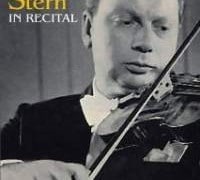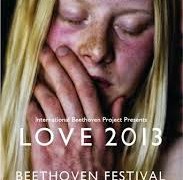Kim Becker, 17, is a viola player in the National Youth Orchestra, which plays next month at the BBC Proms. She is a student at Cardinal Newman College and studies music at the Junior Royal Northern College of Music every Saturday.

For the past two years she has been busking in her home town, Chorley, to raise funds for a new viola. But now she has been forced to stop. A few days ago, Kim was playing her viola outside Booth’s food shop when she was intimidated by a man who told her, ‘You’re not good enough for round here, you should play popular stuff people know.’
Kim told www.slippedisc.com: ‘I’m trying to raise funds for a new viola and busking is a really good way, but I now don’t feel I can busk in Chorley. This man was very rude and unpleasant and made me stop’.
Kim’s mum, Kath, said: ‘This has happened once before, when someone was really nasty to Kim. She’s a brilliant player and I can’t believe people could abuse a talented teenager who’s simply trying to earn some money and brightening up the town centre for shoppers.’
Kim adds: ‘I’d be really grateful next time I’m busking to hear from people who would like to support me. I am hoping for a career in music but it is an expensive path to go down so busking is a great way for me to make contacts and earn some money. Not only that but it lets me share my passion for music with everyone! I appreciate positive feedback and enjoy talking to shoppers and passersby but this man was incredibly unkind’.
If anyone knows who this rude man might be, do urge him to apologise.
The rising American violinist Eric Silberger has asked us to share some of his close memories of the late maestro:

He once told me, “always remain humble, our friendship depends on it.”
In front of the music, he was extremely humble and always dedicated to achieving the highest standards possible.Even though he had conducted the same works hundreds of times (for instance, the overture of La Forza del Destino), he always revisited the scores before bringing the music to life once again.
Once when I went last year to a performance of Don Carlo he was conducting at the Met, I saw him backstage during the intermission. He went on to speak very candidly about the performance and the music. He related to me that once in a previous performance of the opera, he had taken a leap in the podium that resulted in such a clatter that everyone in the pit looked up in surprise. It was a spontaneous decision that helped to realign the orchestra with the singers on stage and one which he told me he had never used before. He conducted a truly grand and moving rendition of the opera which lasted for 5 hours in which he stood the entire time.
Castleton is where I saw him at his most relaxed. Yet that did not stop him from rehearsing with the orchestra and singers here for 9 hours a day as recently as last summer. He told me that the weeks at Castleton were his “vacation”. I can certainly say that his vacation was more productive than any other I have ever seen! The music and atmosphere at Castleton is what helped reenergize him every year.
Throughout my time with him, he was always very encouraging both personally and musically. He once told me always to “trust your intuition.” (One) morning I was running (literally) on the farm here to a rehearsal and was picked up by a car he was riding in. He immediately started discussing aspects of phrasing and contrast. One thing he was always adamant about was not having “mezzo mezzo” playing. Contrasts in dynamics, colors, and expression, when used with the sincerity he had so much of, really brought life to the notes on the page.
He loved challenges and loved challenging others to see what limits there were to one’s abilities. Last summer, he put me to the test and asked me to learn the Barber Concerto in one day to play in a rehearsal with him conducting. He had a one track mind where anything he asked for he believed could happen–and it did. It was not unusual to work with him on a Mahler Symphony and Puccini Opera on the same day and then to play chamber music at night. Under his direction, I also served as principal in the orchestra, and co-founded the Castleton Chamber Players with my colleague Daniel Lelchuk.
I will miss not only the music he brought to the world, but also his eternal optimism, belief, fearlessness, and most of all his sincerity. His life is a true example of what is possible when you live your life to the fullest. I hope to as much as possible take what I learned from him and pass on his legacy every time I pick up the violin, a score, or have a moment to reflect and just enjoy. Living life in such a way is truly a life well spent.
(C) Eric Silberger/www.slippedisc.com
The Nielsens are in. Top-selling album is Amazing Grace by Charity Tillemann-Dick, a soprano who had a double-lung transplant in January 2012.
Story sells these days, not music.

Click here for video.
In the interests of balance, and in the belief that we all good made up of good and bad in unequal parts, we are publishing the following response to recent revelations on www.slippedisc.com about the great American violinist.
Dear Norman,
Below is what I said at the June 1987 Conference of the American Symphony Orchestra League (now the League of American Orchestras) when I had the honor of presenting the League’s Gold Baton Award to Isaac Stern. Re-reading it now, after all these years, I think it is still a good summary of who Isaac was, and what he did. In the 40 years or so that I knew him I never heard him speak ill of another musician. He did often suggest artists to me that he thought were talented and deserved a chance to perform – something I rarely experienced other soloists doing.
While I obviously can’t prove that Isaac Stern never spoke against other musicians, or prevented them from appearing at Carnegie Hall or the 92nd Street Y, I agree with you that he could not have destroyed the careers of musicians who would otherwise have made it to the top. There were plenty of other reasons that Aaron Rosand, Ivry Gitlis and Erick Friedman’s careers did not go as well as they would have liked, and it is utter nonsense to say that Szeryng’s and Heifetz’s careers were in any way damaged by him.
All the best,
Peter Pastreich (former Executive Director of the Nashville Symphony, the Kansas City Philharmonic, the St. Louis Symphony, the San Francisco Symphony, and the Philharmonia Baroque Orchestra)

PRESENTATION OF GOLD BATON AWARD
TO ISAAC STERN
June 12, 1987
My first encounter with Isaac Stern was in March, 1960. I was Manager of a community orchestra in New York City called the Greenwich Village Symphony, and we were going to perform the Mozart Sinfonia Concertante with our Concertmaster and principal violist as soloists, in the auditorium of PS 41 on West 11th Street. The violist knew Isaac Stern, the famous violinist, and thought he might get him to agree to be photographed with our conductor and soloists, and that one of the Greenwich Village weekly newspapers might print the photograph. They were invited to Mr. Stern’s apartment, with me going along to take the picture, and as long as we were there, Mr. Stern listened to them play the entire piece, then spent over an hour coaching them in it, and finally offered our Concertmaster, whom he’d never met before, the use of a better violin for the performance. In the 27 years since then, I, and all of you, have had many more opportunities to witness Isaac Stern’s generosity, his caring his knowledge, and his passion for music.
Isaac Stern was born in the Ukraine and was brought by his parents to San Francisco when he was 10 months old. He began to study the violin at 8 and made his debut in the Saint Saens b minor with the San Francisco Symphony at 15, a year later playing the Brahms Concerto with Pierre Monteux and the San Francisco Symphony. In the 51 years since, he became a major cultural force and the greatest violinist America had produced.
Isaac Stern has honorary degrees from a dozen universities including Yale, Columbia, Johns Hopkins and the University of Tel Aviv. He is a Commander of the French Legion of Honor, has the Danish Commander’s Cross and is a Kentucky Colonel. He has received the Wolf Prize, Israel’s most important prize, for service to humanity; the Kennedy Center Award, presented by the President of the United States, for lifetime achievement in the Arts; and the first Albert Schweitzer Music Award for “a life dedicated to music and devoted to humanity.” Today the American Symphony Orchestra League has the privilege of presenting Isaac Stern with its Gold Baton Award, the highest honor this nation’s symphony orchestras can bestow.
What is it that makes Isaac Stern so unique as a man and as an artist? First, his incredible energy, which permits him to play concerts and recitals, record and play chamber music, plan and supervise projects in New York, Paris and Tel Aviv, stay in touch by phone with musicians, managers, composers, instrument dealers, politicians and heads of state, all simultaneously, and still to be a loving and devoted husband to Vera and father to his children, Shira, Michael and David.
Then, his extraordinary loyalty. In 1940, Sol Hurok became Isaac’s manager, and he remained his manager until Mr. Hurok died in 1974; ICM has been his American manager since then. Michael Rainer, and Rainer’s father before him, managed Isaac in France since 1949, and in that same year, Harold Holt became his English manager. Both relationships continue strong after 38 years. He has recorded for one company — CBS Records — for 41 years. For 33 years, from 1940 to 1973, Isaac Stern’s accompanist was Alexander Zakin, the longest such musical relationship in history. No artist has appeared as often with the New York Philharmonic, or the San Francisco Symphony, as Isaac Stern. Married, so far, for 36 years, Isaac’s many friendships are close and unwavering. It is inspiring to me to see, when Isaac returns to San Francisco to play with our orchestra, as he has 94 times in the last 52 years, how he always spends time with the friends of his childhood; how he never forgets those who helped him as a young man. At every one of his San Francisco concerts, Mrs. Blinder, the 91-year-old widow of Naoum Blinder, Isaac’s teacher and the San Francisco Symphony’s Concertmaster 40 years ago, sits in the auditorium, proudly beaming at Isaac.
Third, there is the breadth and depth of Isaac Stern’s interests and accomplishments. Fluent in five languages, an expert on international relations, politics, education, a connoisseur of string instruments and bows, of food, wine and cigars, Isaac’s musical interests and knowledge are comprehensive and far ranging. He has recorded over 200 works by 63 composers and has played virtually every important work written for the violin. He gave the first American performance of the Bartok First Violin Concerto and the first performance of the Leonard Bernstein Serenade. He made the first recording of those two works, of the Samuel Barber and the Hindemith violin concertos. Penderecki, Rochberg, Dutilleux and Peter Maxwell Davies all wrote major works for him and he not only performed but recorded all of them. His influence has been felt in the world of television and film, including his appearance, as Eugene Ysaye, in the film “Tonight We Sing,” his “ghosting” for John Garfield in “Humoresque,” his performance on the sound track of “Fiddler on the Roof,” and the documentary films “A Journey to Jerusalem” and “Mao to Mozart: Isaac Stern in China,” which won an Academy Award.
Fourth, there is Isaac Stern’s social conscience. In 1963, when I was General Manager of the Nashville Symphony, there was only one great and famous guest artist we could get to appear with our orchestra — Isaac Stern. There were other great and famous artists around, but their fees were too high; only Isaac kept his fee low enough so he could be heard in cities like Nashville, Tennessee. Some other aspects of Isaac’s social conscience are obvious: He saved Carnegie Hall from destruction and preserved it as a great cultural resource for New York and this country, and he still serves as President of the Carnegie Hall Corporation. He was the founder of the Jerusalem Music Center in 1973 and is Board Chairman of the America-Israel Cultural Foundation. These things we all know, and they represent the public side of Isaac’s social conscience. But what many of us don’t know is the private side. Possibly we know how he helped Itzhak Perlman, Pinchas Zukerman and Shlomo Mintz, bringing Pinky and Shlomo to the United States, arranging for scholarships for them to study with Dorothy Delay, finding them management and helping their careers. But when I called Dorothy, she told me about the many other young music students she’s taught, who arrive in New York without friends or money, and about Isaac finding them friends of his to live with, sending them to his dentist, at his expense, getting them instruments and bows, and most important, listening to them play. Dorothy said to me, “People know that when there’s any really talented kid, Isaac will want to know. He’ll always find time to listen.” Dorothy said, “I love Isaac — and I’m so happy he’s there.”
But the most important source of Isaac Stern’s uniqueness is Isaac Stern, the musician. In his playing we hear the spirit of his musical heroes: Kreisler, Heifetz, Hubermann, Ysaye, Oistrakh . . . and Casals, who, like Isaac, could leave no note uncaressed. His playing is characterized by a depth of understanding of the composer and by a unique ability to communicate the composer’s innermost meaning to his audience. When he plays, Isaac talks to us, he sings to us, he makes love to us.
When someone recently asked another long-time friend of Isaac’s, Alexander Schneider, the question, “Who is the best of the young violinists?” Sasha replied, “Isaac Stern.”
We’ve all heard the joke about two old people walking on 57th Street. One says to the other, “I heard Isaac Stern last night,” and the other replies, “Yeah? What’d he say?” We’re here to honor Isaac for what he said, for what he played and for the way he played it, for what he did, and for what he has done for music and for the people who make and love music.
What’d he say? What’d he do? Very likely more than any other musician of our time.
Isaac, it is a great honor for me to present you with the American Symphony Orchestra League’s 1987 Gold Baton Award.
– Peter Pastreich, 12 June 1987

This has just been posted by Angela Gjeorghiu, 45 minutes before an ROH Boheme screening in Trafalgar Square.
The airline has issued SPECIAL BAGGAGE REGULATIONS:
ANTLERS – large antlers my be checked in on most flights, (one RACK per passenger), for a fee of $150. On Dash * aircraft only medium sizes antlers will be accepted. On CRJ aircraft only small antlers will be accepted.
MUSICAL INSTRUMENTS –
Musical instruments are considered a fragile item and may be checked in. Small instruments may be carried on. Large instruments considered TOO FRAGILE to be handled as checked baggage “by the customer” may be carried on board when an extra seat is purchased.
Cellos and BASS VIOLAS will only be accepted as seat baggage.

Now where did we put that bass viola?
h/t: Nick Durrant
The mezzo-soprano Fiona Kimm contributes this impression of the late Eilene Hannan.

I was very sad to hear of the death of Eilene Hannan last week, at the early age of sixty eight.
Not only was she a singer with a voice of remarkable beauty, but a supportive and generous colleague, who made working with her a delight. I sang with her in three productions in the 1980s. “Rusalka” at English National Opera was a landmark; a production of immense depth and subtlety by David Pountney, it was remarkable for many superb performances, but above all for Eilene’s extraordinary portrayal of the title role. She combined a beauty of sound with a poignancy, fragility and depth of characterisation which truly broke your heart! It was a privilege to be a part of that wonderful experience. And it is so good that Eilene’s performance has been preserved on DVD, though it captures only a part of her charisma in live performance.
I then sang with her in the ENO production of “War and Peace”, in which she again excelled as Natasha. In everything she did, Eilene found the core of the person she was playing, and both as a colleague and as a member of the audience, you were caught up in the reality of her performance. It was a really enjoyable experience too. She and I sat on our balcony, before singing the girls’ duet, listening to Tom Allen singing Bolkonsky’s aria below us, both of us in total admiration for his singing.
Despite her own formidable talent, Eilene always was generous towards others. This great production, and Eilene’s notable interpretation, was one of the highlights of the ENO tour to the USA in 1984 (We also had a less than pleasant experience during one of the Coliseum runs – a bomb scare, where we all had to evacuate the building. It was November, and Eilene and I were in nighties. Perishing!
The last opera we did together was Graham Vick’s production of Eugene Onegin for Opera North with Jonathan Summers. It was a very enjoyable experience, and yet again, Eilene’s ability to sing this repertoire, which requires strength and focus, and still bring out the vulnerability and fragility of Tatyana, was an object lesson. I’m very grateful to have known her, and to have learnt a great deal from watching and listening to a consummate artist, who never short changed the composer, the audience, her colleagues or herself. She was a very special person.
Chicago’s non-paying Beethoven Festival has posted the following website statement:
A new announcement will shortly be made about the status of Beethoven Festival: WALKABOUT 2014, in light of recent events. We appreciate your patience at this time.
For ‘recent events’, read exposure on Slipped Disc.
This is no way to get back into business, George Lepauw.
First say sorry to the musicians you have wronged. Then apologise to the community at large for your inexperience.
After that, maybe they’ll trust you again.
Maybe.

Royal Opera director Kaspar Holten has tweeted the remarkable result. The house played opera to near-capacity in 2013/14.
Peter Gelb’s pessimistic pronouncements stand in splendid isolation.
If everyone else is filling the house and he is not, what conclusion can we draw?

This is Lindsey Stirling. Nobody has done bigger.
She plays. She dances. She talks about her eating disorder.

ABC News | ABC Sports News
Members of the National Youth Orchestra of the USA settle their differences in the cellars of Purchase College, SUNY.

Eagle-eyed readers will have seen a liquid stream of news running at the bottom of the Slipped Disc main page. It comes from our former hosts, www.artsjournal.com, who are happy to continue that relationship with a reciprocal stream of www.slippedisc.com stories.
(Thanks, Doug.)
Also uploaded today is our new community page, occupied by Hello Stage. Click the Community tag at the top of the page to see more.
Hello Stage, based in Vienna, is an international platform that hosts the websites of hundreds of classical artists and singers, as well as dozens of classical institutions. Instead of having a website that exists in isolation, you can link to HS and be part of a global community.
Every day, HS will display new pages and videos by its member artists. It doesn’t cost much to join, and from today your website will be seen not only by HS members but by the entire www.slippedisc.com readership…. a matter of 1.25 million readers every month.
Take a look.













